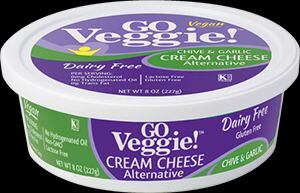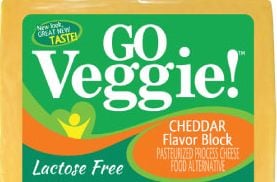Today, they are tasty, affordable and - like almond milk or gluten-free health bars - designed to appeal to a far broader demographic than the allergic or intolerant, although this group now represents a sizable portion of the US population, says Go Veggie marketing director Jamie Schapiro.
“With 8% of children in the US estimated to have a food allergy - that’s one in every 13 kids - food allergies of one kind or another are becoming part of the mainstream now.”
An estimated 10-15% of the US population is lactose intolerant, while 2-5% of infants have a milk allergy
As for the broader demographic Go Veggie is targeting, the potential is significant, given that its products are aimed at everyone from the lactose intolerant* (an estimated 10-15% of the US population**), to those allergic to milk protein*** (2-5% of infants), vegans (0.5%-3%), some vegetarians (for example those avoiding animal rennet in cheese), people looking to reduce their saturated fat intakes or a whole swathe of people seeking to cut down on dairy for health, ethical or environmental reasons.
Indeed, while Go Veggie is known for lactose-free and dairy-free cheese alternatives (slices, blocks, shredded cheese, grated cheese toppings and cream cheese), the brand could potentially expand into a far wider range of products and categories, says Schapiro.
“We already appeal to a very broad spectrum of people including those who are lactose intolerant or want to improve their health by following a more plant-based diet and those who want to eliminate dairy completely because of food allergy or a vegan lifestyle.
“We could extend Go Veggie into other non-cheese-related categories, as we have great brand recognition. We’re in every major grocery chain and we also have a strong presence in the natural foods channel.”
Retailers are allocating more space to the cheese alternatives category
But there is still a lot of room for growth in cheese alternatives, he adds, given that there are lots of people that still don’t realize that there are alternatives to cheese, or don’t realize that what’s available now is considerably better than what they tried 10 or 20 years ago.
And the good news is that retailers are also waking up to the opportunity, he says.

“Retailers are allocating more space to the cheese alternatives category, so as more competitors come in or we introduce new products, something else doesn’t necessarily have to come out.”
Where Go Veggie products are stocked, however, depends on the chain and the location, he adds. “In some places we’re in the produce section, in others we’re in the dairy case and in others we’re in the natural foods section.”
So what’s the size of the prize and how fast is the category growing?
In the week ending March 16, 2013, retail cheese alternatives represented a $60.5m market growing at 12.5% YoY, according to Nielsen data, says Schapiro. And that’s excluding Cabot, which is naturally lactose free (and made with a microbial-based enzyme approved for vegetarians).
However, Go Veggie is also seeing strong growth in foodservice and industrial channels (selling cheese alternatives to food manufacturers making pizzas and other processed food products that would normally contain cheese).
The Go Veggie brand

While the company behind Go Veggie is called Galaxy Nutritional Foods, the Galaxy brand no longer features on its products, which now all have the ‘Go Veggie’ name, says Schapiro.
The new Go Veggie brand comes in two distinct colors: Green for lactose-free products, which contain casein (milk protein) - for the lactose intolerant; and purple for dairy-free products - for people with milk allergies and intolerances, vegans, and those avoiding dairy or trying to reduce fats and cholesterol.
*Lactose intolerant people struggle to digest lactose, a type of sugar found in milk, because they don't make enough of an enzyme called lactase (which breaks down lactose).
**According to estimates of the National Institute of Diabetes and Digestive and Kidney Diseases (NIDDK) of the National Institutes of Health (NIH).
***People with a milk allergy are allergic to proteins in milk, so typically avoid it altogether.
